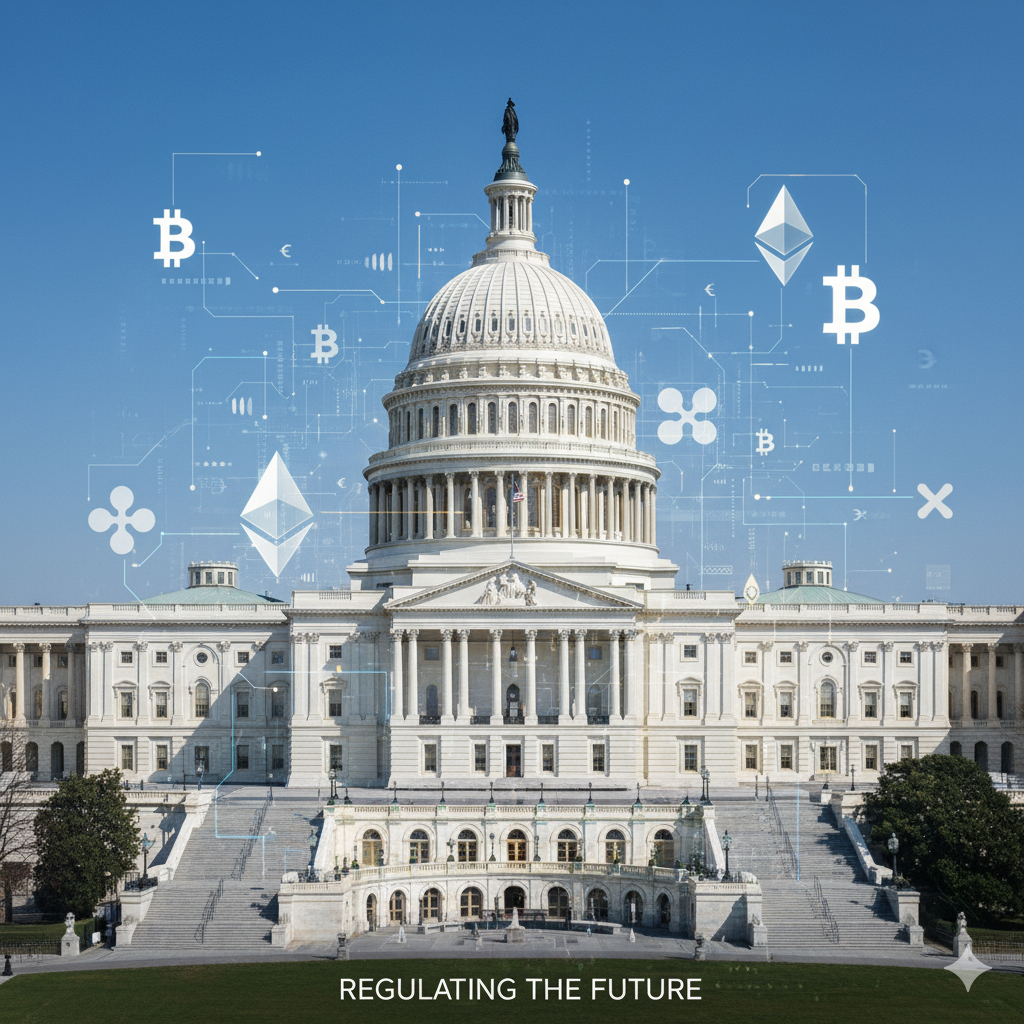Tensions Rise as Senate Democrats, Republicans Meet Crypto Leaders on Stalled Market Structure Bill
Crypto CEOs met with divided Senate Democrats and Republicans in high-stakes roundtables to revive stalled market structure legislation. Ripple's Stuart Alderoty pushed for XRP protections as partisan tensions over DeFi regulation threaten the bill's path forward.

October 22, 2025 | Crypto Regulation
In a pivotal day for digital asset policy, cryptocurrency industry leaders met separately with Senate Democrats and Republicans on Capitol Hill to salvage stalled market structure legislation amid escalating partisan tensions. The unprecedented dual roundtables highlighted deep divisions over how to regulate decentralized finance while underscoring bipartisan commitment to advancing crypto clarity before year's end.
High-Stakes Meetings Expose Deep Partisan Divide
The Wednesday meetings, first reported by journalist Eleanor Terrett, brought together top executives from Coinbase, Chainlink, Galaxy Digital, Kraken, Uniswap, Circle, Ripple, and other major firms with pro-crypto senators from both parties. However, the sessions revealed significant fractures in the legislative process rather than consensus.
According to sources familiar with the Democratic roundtable, the morning session led by Senator Kirsten Gillibrand (D-NY) began with tensions running high. "I'm really fcking pissed about what happened last week," one Democratic senator reportedly told industry attendees, adding, "Don't be an arm of the Republican Party. They used you all and your megaphones to f** us."
The heated exchange came after industry leaders publicly criticized a leaked Democratic proposal on decentralized finance earlier this month. The six-page proposal focused on curbing illicit activity in DeFi, mandating Know Your Customer (KYC) requirements on DeFi frontends, establishing a "restricted list" for certain protocols, and eliminating legal protections for blockchain developers.
Industry Leaders Push for Bipartisan Progress
Despite the tense atmosphere, crypto executives maintained optimism about advancing legislation. Chainlink CEO Sergey Nazarov told CoinDesk between the two meetings that "it's clear there's a sufficient level of Democratic support," noting that more than 10 lawmakers attended, "all very committed to investing their time and effort in making the bill a success."
Key industry participants included:
- Brian Armstrong, Coinbase CEO
- Sergey Nazarov, Chainlink CEO
- Mike Novogratz, Galaxy Digital CEO
- David Ripley, Kraken CEO
- Hayden Adams, Uniswap CEO
- Stuart Alderoty, Ripple Chief Legal Officer
- Dante Disparte, Circle Chief Strategy Officer
- Miles Jennings, a16z Crypto General Counsel
- Kristin Smith, Solana Policy Institute President
- Rebecca Rettig, Jito Chief Legal Officer
Senate Minority Leader Chuck Schumer attended the Democratic meeting, signaling leadership interest, while notably absent was Senator Elizabeth Warren, the Senate Banking Committee's top Democrat and vocal crypto skeptic.
The afternoon Republican roundtable, hosted by Senate Banking Committee Chair Tim Scott (R-SC) and Senator Cynthia Lummis (R-WY), also featured President Trump's Crypto and AI Czar David Sacks at a 10 a.m. meeting, reinforcing the administration's push to pass market structure legislation this year.
What's at Stake: The Market Structure Divide
The Senate is working to craft its own version of crypto market structure legislation after the House passed the Digital Asset Market Clarity Act (CLARITY Act) in July 2025. The legislation aims to establish clear jurisdictional boundaries between the Securities and Exchange Commission (SEC) and the Commodity Futures Trading Commission (CFTC)—a fundamental issue that has plagued the industry for years.
The Republican draft introduces the concept of "ancillary assets" to determine which tokens should not be treated as securities, offering stronger developer protections and a clearer pathway for tokens to transition from securities to commodities.
However, the leaked Democratic proposal drew immediate backlash. Coinbase CEO Brian Armstrong described it as "unviable," arguing it would stifle U.S. innovation and drive talent overseas. Uniswap founder Hayden Adams warned it could "kill DeFi in the U.S.," potentially harming the $100 billion DeFi market.
Timeline Pressures Mount Amid Government Shutdown
Initial optimism about passing legislation before President Trump's August deadline has faded. Senator Tim Scott's September 30 markup deadline also passed, with Senator Lummis recently suggesting end-of-year as a more realistic target. The ongoing government shutdown—now in its third week and officially the second-longest in U.S. history—has further complicated legislative efforts.
After the Republican roundtable, Senator Scott's spokesman issued a statement calling on "Democratic colleagues to immediately return to the negotiating table, engage in serious bipartisan discussions and offer substantive feedback on our bill."
Democrats, however, have indicated they want to agree on base legislative text before proceeding to markup. According to sources familiar with Democratic thinking, lawmakers warned industry representatives that if they attempt to derail negotiations again as they did with the leaked proposal, "it's gonna set us back again."
XRP and Ripple: Critical Stakes in Regulatory Clarity
For XRP and Ripple, the outcome of these negotiations carries profound implications. Stuart Alderoty's participation in both roundtables reflects Ripple's strategic priority: securing regulatory clarity that protects mature, decentralized digital assets from indefinite SEC oversight.
Ripple's Concerns About "Ancillary Assets"
In an August 2025 response to the Senate Banking Committee's Request for Information, Alderoty warned that the current definition of "ancillary assets" in the Republican draft "risks significant regulatory overreach because it effectively presumes that any token once offered in connection with an investment contract places future transactions of that token by the originator under SEC jurisdiction indefinitely."
This directly contradicts Judge Analisa Torres's landmark 2023 ruling in the Ripple vs. SEC case, which found that everyday sales of XRP on crypto exchanges are not investment contracts and therefore don't violate securities laws.
What XRP Needs from Market Structure Legislation
Ripple has advocated for several critical protections:
- Five-Year Safe Harbor: Tokens that have existed for five or more years on permissionless, open networks should be presumptively excluded from securities regulation. XRP, launched in 2012, clearly qualifies.
- Objective Transition Criteria: Instead of leaving tokens in regulatory limbo, legislation should establish clear, defined processes for digital assets to officially transition from securities to commodities, removing dependency on discretionary SEC action.
- Decentralization Recognition: The bill must account for the decentralized nature of mature networks that no person or group controls, preventing perpetual SEC jurisdiction over truly decentralized assets like XRP.
Impact on XRP Adoption and Price Potential
Regulatory clarity from this legislation could unlock significant opportunities for XRP:
Institutional Adoption: Banks and financial institutions have been waiting for regulatory clarity before implementing XRP for cross-border payments at scale. Clear rules distinguishing XRP from securities would remove the primary barrier to institutional integration.
Partnership Expansion: With definitive commodity status, Ripple could accelerate partnerships with traditional finance institutions, payment processors, and central banks exploring blockchain-based payment rails.
Exchange Listings: U.S. exchanges that remain cautious about listing XRP due to regulatory uncertainty could confidently add the asset, improving liquidity and accessibility for American investors.
Price Implications: While past performance doesn't predict future results, regulatory clarity removing the SEC cloud over XRP could eliminate a significant discount in its market valuation compared to other major cryptocurrencies.
Ripple's Legal Standing Strengthens Its Voice
Ripple's decade of regulatory experience and hard-earned lessons from its SEC battle position the company uniquely to shape final legislation. Alderoty's presence at both Wednesday roundtables ensures XRP-specific concerns about perpetual SEC oversight are directly communicated to lawmakers drafting the final bill.
The National Cryptocurrency Association, a crypto education nonprofit launched with a $50 million grant from Ripple and led by Alderoty as president, has been actively lobbying for comprehensive crypto rules. Recent polling the organization commissioned shows roughly one in five U.S. adults owns crypto, with a majority favoring stronger regulatory guardrails.
What Comes Next
The path forward remains uncertain but critical. Industry observers suggest several possible scenarios:
Optimistic Case: Bipartisan negotiations resume following the roundtables, with both sides making concessions on DeFi language and ancillary asset definitions. A compromise bill reaches markup in November or December, passing before the 2026 midterm cycle dominates congressional attention.
Realistic Case: Negotiations extend into early 2026, with legislation potentially passing in the spring before midterm campaigning intensifies. Both chambers would need to reconcile differences between House and Senate versions.
Pessimistic Case: Partisan divisions prove insurmountable, pushing comprehensive market structure legislation past the midterms into 2027 or beyond, leaving the industry in continued regulatory limbo.
Kristin Smith of the Solana Policy Institute described Wednesday's meetings as happening with lawmakers "committed to getting market structure legislation right." Senator Lummis called it a "big day in Washington for digital asset market structure."
Coinbase CEO Armstrong emphasized momentum before the meetings: "Momentum for market structure clarity is at an all-time high, which is why we've seen both sides commit to getting to work on a bill, even during a shutdown."
Conclusion: A Critical Inflection Point
Wednesday's dueling roundtables represent a critical test for crypto's legislative agenda. The meetings exposed raw partisan tensions but also demonstrated continued bipartisan engagement with industry leaders despite a government shutdown and approaching midterm pressures.
For the broader crypto market, the stakes are clear: comprehensive market structure legislation would provide the regulatory certainty needed for institutional capital deployment, product innovation, and U.S. competitiveness in blockchain technology.
For XRP specifically, the legislation could finally resolve years of regulatory ambiguity, potentially unlocking institutional adoption and removing market valuation discounts associated with SEC uncertainty.
The coming weeks will determine whether lawmakers can bridge partisan divides and deliver on President Trump's push for crypto clarity, or whether the industry faces continued regulatory fragmentation extending well into 2026. As U.S. crypto venture funding has already declined 30% year-over-year, the window for action is narrowing.
Sources
- Eleanor Terrett's X/Twitter Coverage - Original breaking news on scheduled meetings
- The Block: Tensions Rise as Senate Democrats, Crypto Executives Meet - Inside details from Democratic roundtable
- CoinDesk: U.S. Senate Democrats Assure Crypto CEOs - Chainlink CEO Nazarov quotes and meeting outcomes
- Blockworks: Democrat Tells Crypto Execs Republicans 'Used Them' - Senator Gallego quotes and partisan dynamics
- Crypto In America Newsletter: Capitol Hill Takeover - Detailed timeline and David Sacks involvement
- Bitcoin Ethereum News: Crypto Executives to Meet Senate Democrats - Leaked DeFi proposal details and industry reactions
- CryptoNews: Top Crypto Leaders Meet Senate Democrats - Background on legislative stalemate
- Roll Call: Senate's Next Crypto Bill Slowed - Senator Lummis and timeline analysis
- The Hill: Senate Crypto Bill Negotiations Hit Roadblock - Blockchain Association CEO Mersinger statement
- CoinGape: Ripple Responds to U.S. Senate RFI - Stuart Alderoty's detailed response to Senate Banking Committee
- CoinEdition: Ripple Warns Senate Crypto Bill - Ancillary assets concerns and Judge Torres ruling reference
- CoinPedia: Ripple Responds to Senate Crypto Bill - XRP-specific regulatory implications
- 99Bitcoins: XRP CLO VS Senate Meeting - XRP price and institutional adoption analysis
- CoinDesk: Ripple CLO Says Washington Must Finish Job - National Cryptocurrency Association polling data
DISCLAIMER: This newsletter is for informational purposes only and does not constitute investment advice, advertising, or a recommendation to buy, sell, or hold any securities. This content is not sponsored by or affiliated with any of the mentioned entities. Investments in cryptocurrencies or other financial assets carry significant risks, including the potential for total loss, extreme volatility, and regulatory uncertainty. Past performance is not indicative of future results. Always consult a qualified financial professional and conduct thorough research before making any investment decisions.



